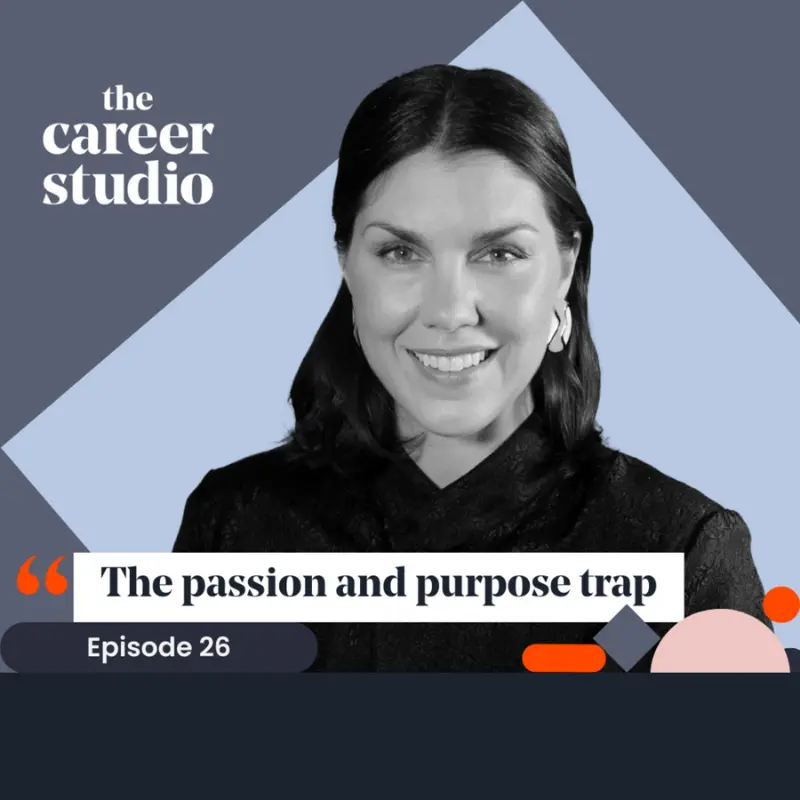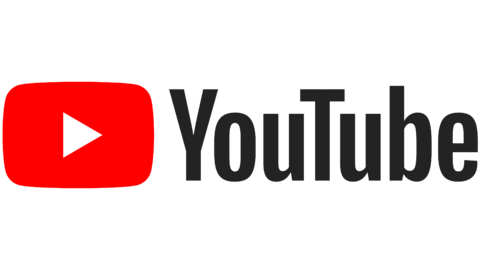The passion and purpose trap

Find your passion, follow your purpose are two of the biggest red herrings when it comes to creating an energizing career you love. I explain why this is and what you should focus on instead in this episode.
I discuss:
- Why find your passion and follow your purpose is a trap
- The importance of interests in creating an energizing career you love
- How to re-orient your career around your interests
- How orienting around my interests helped me find my current passion
Are you ready to create an energizing career you love?
You can create a career that is simply an extension of who you are and how you want to live your life. If this sounds like what you’re after then schedule a consultation. We'll get to the bottom of what's going on for you. And exactly where you need to focus to bring your career and life into alignment. It's free!
For more from The Career Studio
Transcript
Welcome to the career studio podcast, where we boil down the noise and focus on the core concepts, essential for building an energizing career you love. One that is simply an extension of who you are and how you wanna live your life. Anyone can do it. It's just a matter of knowing what to focus on.
Hey guys, I wanted to come on today and rant a little bit about one of the things that annoys me the most about the sector, I guess, that I'm in. Career development. I called this episode, I think I'm going to call it at least the passion purpose trap. And that's what I want to talk about. I think we hear a lot in the media, at talks that we might go to, you know, find your passion, follow your purpose, right?
If you follow your passion, success will follow. Do what you love and you'll never work a day in your life, like the seven steps to find your life purpose. Figure it out. You know, everyone's like, here's the tools to figure out your passion, to figure out your purpose. And I think this is the absolute biggest red herring when it comes to career fulfillment. It's really absolutely terrible advice. It gets people off track for the following reasons.
Follow your passion. Find your purpose. This implies like a very high level of conviction, a certainty, a real energy, passion, purpose. You imagine that there's like this, this fire. Around something. Okay. So when the advice is follow your passion, find your purpose, people stay stuck, right?
They're in a job that Whatever is not working for some reason, or they feel like it's not the long term solution for them, but they don't know what their passion is. They don't know what their purpose is because they don't feel like a level of conviction. They're not like, Oh my God, this is it. Now I can go out and follow it.
It implies that you have to have this. Oh my gosh, clarity, feeling about something. So we wait, we wait and wait and wait to figure out what our passion or purpose is. It also implies that, I don't know, that we're quite singular, right, that we'll be obsessive with one thing, like, oh, I'm so passionate about crypto, or like, my purpose is to help give more clean water to communities around the world.
There's almost like a singularity, in the way that we define passion and purpose and a lot of people, certainly the people I work with have a range of interests. There's a lot of things that interest them. There's not just one thing and passion and purpose implies one thing. That we're obsessed with.
I think it also puts a lot of pressure on impact, right? You know, every tech startup is mission driven, and obviously it's great to have a mission, and it's great to be very clear on why the business exists and, and the impact we're trying to make. But I, it's almost like we've over rotated. Everyone is doing, you know, the Tom's model.
Everyone has some sort of mission, a touch to their business, and sometimes it's a bit throwaway, but I think it just puts this level of pressure on creating positive impact that not everyone has conviction around people want to do things that are interesting and rewarding, but not everyone needs to save the children.
I mean, obviously, let's save the children, but not everyone has that kind of fire or that kind of direction inside them. So, yeah, I, I think, this language, to sum it up, one, it keeps people stuck because they're waiting for a level of conviction, two, it implies that, you know, we're quite singular. Or even that we're going to just have one thing that we then just execute on for the rest of our life.
Right? And then there's a lot of pressure on that. Right? It's like, okay, I have to, I have to choose something and then I have to just do that like that has to be my passion for my whole career and then it's just people second guess themselves because they're like, okay, do I really want to spend the next 30 years working on this topic?
No, right? And so then we continue to wait we continue to wait to find our passion to figure out our purpose because we're not like.. We don't have a conviction that we want to just execute on this one thing for the rest of our career. It implies that once you found your passion or purpose, you just go do that.
And then it implies this level of, of impact that not everyone feels conviction around. So these are all the reasons I think it's terrible advice and I think it generally results in people just staying where they are and putting up with stuff that doesn't really feel energizing because they just think, you know, I'm not someone who has a passion, right?
I don't need a purpose. Like I don't have a passion. I don't need a purpose. I'll just do what I'm doing now. And you know, passion and purpose is for tech entrepreneurs or artists and, you know, or the few people who feel a level of conviction around something. And that's not me. Okay. So I think it leads to a level of complacency.
That is detrimental when you are focused on passion and purpose. It leads to a level of complacency in your life that is detrimental. And the reason I feel so strongly about this is because as follows, there's an amazing book called Grit by Angela Duckworth and she's done a lot of amazing research and based on all of her research she said; "passion emerges from fostering our interests".
Okay. So this is the critical point that is basically underpins so much of the work that I do. It's this idea that passion doesn't arrive one day fully formed and say, Hey, what's up? I'm your passion. Now you can go execute on me. And I think this is what people are waiting for.
They're waiting for this bolt of lightning, this hand of God, this feeling of like, this is it. I can now go do it. And they're waiting for it to come all at once. Right, because they're waiting for passion. They're waiting for clarity around purpose. Okay, but it doesn't arrive one day fully formed rather as per Angela Duckworth. It emerges by fostering our interests. Okay.
And the good thing is we have many interests. Okay. And this is why interests is one of the core parts of brand and the way that I define it. It's not about passion. It's not about purpose. It's about interests. Okay. Because we have many interests and our interests evolve over time.
So what we want to do in our career and in our life is create space to foster our interests. So we can do that outside of work and we can do that inside of work. You know, we can have many interests that we're exploring or we choose an interest. We feel relatively intrigued by and energized by, and we choose our next step around that.
Okay. But this is a much lower barrier to entry than passion. Okay. I'm interested in a topic. There's also this level of understanding that that interest can evolve. Right? And our interests can change. And what interests us 10 years ago or right now might not interest us in another 10 years. Okay? So I really like reorienting around interests to help us direct our career rather than passion or purpose.
Okay, because interests, if you think about your interests, you can list out a whole load of things. And you can ask yourself, who has a career that I think is interesting? What is so cool about it? What do I like about that person's career? What are the things that I find interesting? And then this allows us to make a short list of topics that interest us that we could explore, right?
What in my current role do I really enjoy? What if you read or heard about something recently where your reaction was like, ooh, that's cool, right? This provides you with a shortlist and these are then directions that you can explore or create space to foster So what do I mean by creating space to foster?
I basically mean, reading about those interests, talking to people who are focused on those interests and creating opportunities for yourself to take action against those interests. So, I mean, like, doing projects that allow you to explore those interests and how you might be able to create. And give value to the world through those interests.
I mean, if you think about my career, I've had many interests that I've built my career around. So, you know, early on I was interested in marketing, and that kind of switched to advertising, and I really liked that as a topic. I was kind of brand agnostic, industry agnostic, but the function of advertising and brand strategy and marketing, that was really interesting to me.
And so I, I did roles that allowed me to pursue that interest.
During my MBA, and I don't know if I've ever really talked about this in detail before, I got really interested in smart cities, basically cities that employ technology to operate more efficiently. And this is part of what actually led me into the tech job that I got. I ended up working for a smart home company, which turns out was not as interesting as I thought it would be. But I spent a good 18 months of my life really captured by this interest and exploring it, right?
Exploring it in my free time, talking to lots of people about it and ultimately getting a job in it. Along the way, I was also very captured by the idea of personal development and understanding ourselves and how we work with other people and how we optimize. Our life and how we work more efficiently.
This is another set of interests I've had, and I explored that on the side for many years until that interest became louder and louder, you know, that interest started in advertising. I remember I did Myers Briggs and I met a coach and I, when I became a people manager, I got some coaching and I remember really being super interested in all of the topics that were discussed in that context.
So I really leaned into it when I was working in advertising, and that was a way of fostering my interests. And then I went through my MBA, where I was kind of interested in smart cities, but I was also fostering my interest in personal development and coaching.
I worked with a coach, so obviously working on myself. And then when I was working in tech, which I didn't like, it was another reason to continue to foster the interest around coaching and personal development. And so I started doing some volunteer coaching. I started reading some books about coaching with more intentionality around them.
So now I'm, you know, the energy around this interest continued to grow and it continued to grow and continue to grow until I made it my whole career because the energy built up and built up and built up over time. But certainly I didn't know when I first was introduced to coaching in, I don't know, probably 2013 I didn't know then that that would become something I was very passionate about. You know, that had to develop over time. There's other interests that I've had that I have pursued and that have never had as much energy. So I love taking photographs. I'm very interested in psychedelics. I like surfing.
These are all interests of mine. And I enjoy them, but the energy has never built up to a point where I'm like passionate about this, right? I want to do this full time. It's how I want to make my money. I'm kind of happy to keep them as interests as hobbies. But what's important is that I've created space in my life to foster those interests.
And by doing that, I've allowed myself to better understand who I am and what I'm about. And it ultimately pointed me onto the path of coaching because that interest kept getting more and more energy. This is really the difference. Instead of thinking, I have to follow my passion, I have to find my purpose and kind of waiting for that bolt of lightning to arrive, which by the way, it never will.
What you want to do instead is think what are the things that interest you and create space to foster them. Do that professionally, do that personally, do that in your life and just see what things continue to gather energy, what things really grab your soul. I mean, that's maybe even a bit of an intense way to phrase it, but what things continue to draw you, right?
And that is how you can start to reorient your career in a way that feels better to you. Better than where you are. Okay. It's not about finding passion or purpose. It's simply restructuring your career. So you're doing something that genuinely interests your brain, right? That you enjoy thinking about. It doesn't have to be something you're obsessed with.
It just has to be something you're interested in and you could have many interests. You're a multifaceted person. You don't have to be obsessed with one thing, right? And one of your interests or a couple of your interests, you can make some money around. And then the other interests you do in your spare time.
And, and this is how we create the structure of who we are as a person is by fostering our interests. I think, I don't know. I think a lot of people don't do the introspection of fostering their interests. They kind of have the brand name job and they're moving up through the ranks and, you know, they hang out with their family and friends and they go on nice vacations and they go out to nice dinners, but they don't ever really create space to foster their interests I guess maybe the idea here is to create hobbies.
Right. Really exploring stuff intentionally. I think that's the difference. A lot of people don't create the space to explore hobbies, right? And if you explore stuff and kind of create hobbies around it, ultimately you're going to get the clarity you need to reorient your career.
If you're constantly creating space in your life to explore things that interest you, that's enough. You don't need passion. You don't need purpose. You might get lucky and really get captured by something that you feel super passionate about. You feel a big level of conviction and energy around, but that is not needed to create an energizing career you love.
And what inevitably happens is that who you are and what you want evolve and what you feel interested in will likely change. And that's not wrong, right? I was super excited about brand strategy for many years until I changed. My interest changed and I had to restructure my career around a new set of interests.
It's not about passion. It's just about interests. Have a great week.
Hey, if you're ready to create an energizing career you love, one that is simply an extension of who you are and how you want to live your life. Then I wanna invite you to schedule a consultation. We'll get to the bottom of what's going on for you. And exactly where you need to focus to bring your career and life into alignment. It's free. Just head on over to thecareer.studio/schedule to find a time that works for you, or if you're enjoying and getting value from these episodes, I'd love you to leave a short review on whatever podcast app you use.
This helps other people like you find and get value from the podcast too.



